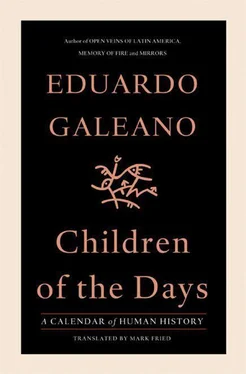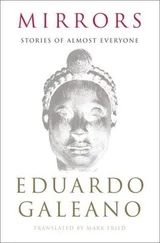The same daily went on to report:
The happy news of Napoleon’s arrival in the capital has caused a sudden and unanimous outburst of joy, everyone is hugging, cheers for the Emperor fill the air, in every eye are tears of bliss, all rejoice at the return of France’s hero and swear the deepest obedience to His Majesty the Emperor.
February 25. NIGHT OF THE KUNA
The Panamanian government passed a law commanding “the settlement into civilized life of all existing barbarous, semi-barbarous and savage tribes in the country.”
Its spokesman announced: “The Kuna Indians will never again paint their noses, only their cheeks, and they will no longer put rings in their noses, only in their ears. And they will no longer dress in molas, rather in civilized attire.”
The religious ceremonies of Kuna women and men, which offended God, were outlawed, as was their mania for governing themselves in their own traditional way.
In 1925, on the night of the twenty-fifth day of the month of the iguana, the Kunas used their knives on all the policemen who forbade them from living their lives.
Ever since, Kuna women wear rings in their painted noses and dress in their molas, a splendid art form done by needle and thread instead of paintbrushes. And Kuna women and men continue holding their ceremonies and assemblies on the two thousand islands where they defend, by hook or by crook, their shared kingdom.
At the end of the nineteenth century, the European colonial powers met in Berlin to divvy up Africa.
Long and hard was the fight over colonial booty, the jungles, rivers, mountains, lands, subsoil, until new borders were drawn, and on this day in 1885 a General Act was signed “in the Name of God Almighty.”
The European lords had the good taste not to mention gold, diamonds, ivory, oil, rubber, tin, cacao, coffee or palm oil.
They outlawed calling slavery by its name.
They referred to the companies that provided human flesh to the world market as “charitable institutions.”
They cautioned that they acted out of a desire to “regulate the conditions most favorable to the development of trade and civilization.”
And if there were any doubt, they clarified that they were concerned with “furthering the moral and material wellbeing of the native populations.”
Thus Europe drew a new map for Africa.
Not a single African was present at that summit, not even as decoration.
February 27. EVEN BANKS ARE MORTAL
“All greenness shall perish,” prophesied the Bible.
In 1995 Barings Bank, the oldest in England, faced bankruptcy. A week later it was sold for the sum total of one (1) pound sterling.
The bank had been the financier of the British Empire.
Independence and the foreign debt were born as twins in Latin America. All of us were born owing. In our corner of the world, Barings Bank purchased nations, rented founding fathers, financed wars.
And believed itself immortal.
When he was descending a spiral staircase onboard ship, it occurred to him that protein molecules might travel the same way, in a spiral over a wavy base. The thought turned out to be a scientific breakthrough.
When he discovered that automobiles were the reason he coughed so much in the city of Los Angeles, he invented the electric car, which was a commercial failure.
When he came down with kidney disease and medicine did not help, he prescribed himself healthy food and bombardments of vitamin C. He got better.
When the bombs exploded over Hiroshima and Nagasaki, he was invited to speak at a scientific conference in Hollywood. And when he discovered that he had not said what he wanted to say, he went on to lead the global campaign against nuclear weapons.
When he received the Nobel Prize for the second time, Life magazine decried it as an insult to all Americans. By then the government of the United States, suspecting him of communist sympathies, had taken away his passport twice, or perhaps it was because he said that God was an unnecessary idea.
His name was Linus Pauling. He was born along with the twentieth century.
February 29. NOT GONE WITH THE WIND
Today’s day tends to drop off the calendar, but every four years it finds its way back.
It is the strangest day of the year.
But there was nothing strange about this day in Hollywood in 1940.
In routine fashion, on February 29 Hollywood gave nearly all of its awards, eight Oscars, to Gone with the Wind , which was a long sigh of nostalgia for the good old days of slavery.
Thus Hollywood confirmed its ways. Twenty-five years earlier, its first blockbuster was Birth of a Nation , an anthem of praise to the Ku Klux Klan.
Eliza Lynch was digging the grave. With her fingernails.
Slack-jawed, the victorious soldiers let her.
Her pawing raised clouds of red dust and shook the loose strands of red hair spilling across her face.
Francisco Solano López, the country’s president, lay at her side.
This woman, now mutilated, did not cry for him, did not even look at him. She threw dirt on him, useless handfuls wanting to bury him in this land that had been his land.
He was gone and Paraguay was gone.
Murdered, the only Latin American country that refused to bow down to the bankers and the merchants.
Five years the war had lasted.
And while Eliza continued hurling fistfuls of earth on the man who had been her man, the sun went down and with the sun went this cursed day in the year 1870.
From the foliage on Cerro Corá, a few birds bid it good-bye.
March 2. WHISTLING, I SPEAK
Whistling is the language of La Gomera.
And since 1999 the tongue preserved by this whistling people has been taught in the schools of the Canary Islands.
In ancient times, the shepherds of La Gomera learned to whistle to communicate from distant hilltops across gorges that multiplied the echoes. Their whistles related news of comings and goings, dangers and delights, work to be done and the days going by.
Though centuries have passed, on that island human whistles remain the envy of birds, as powerful as the voices of the wind and the sea.
March 3. THE FOUNDING MOTHERS OF BRAZIL
This day in 1770 brought an end to the queendom of Teresa de Benguela in Quariterê.
It was one of many sanctuaries of freedom for fugitive slaves in Brazil. For twenty years Teresa had thwarted the soldiers of Mato Grosso’s governor. They never did capture her alive.
In these densely wooded hiding places, women did much more than cook and give birth; a number of them were fighters and leaders, like Zacimba Gambá in Espírito Santo, Mariana Crioula in the hinterlands of Rio de Janeiro, Zeferina in Bahia and Felipa Maria Aranha in Tocantins.
In Pará, on the banks of the Trombetas River, no one questioned orders given by Mãe Domingas.
In the vast refuge of Palmares in Alagoas, the African princess Aqualtune governed a free town until it was torched by colonial troops in 1677.
In Pernambuco the community founded in 1802 by two fugitive black sisters, Francisca and Mendecha Ferreira, still exists. It is called Conceição das Crioulas.
Whenever the slavers’ troops drew near, the former slave women filled their frizzy African tresses with seeds. As elsewhere in the Americas, they turned their heads into granaries, in case they had to flee at a moment’s notice.
Читать дальше













